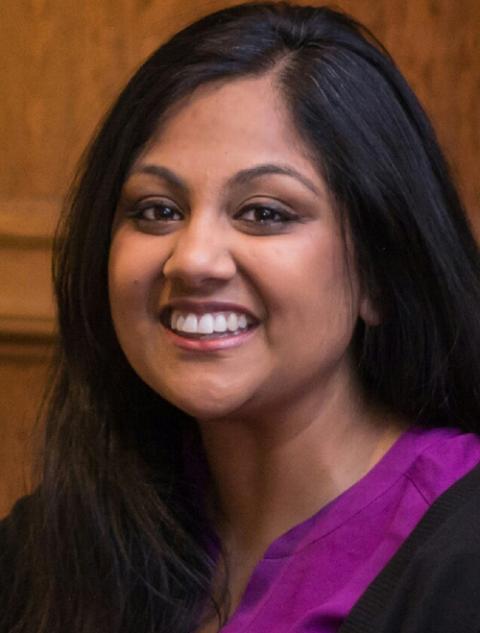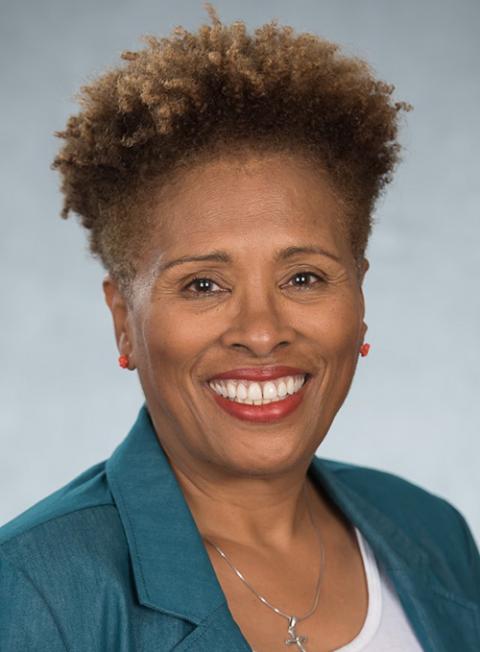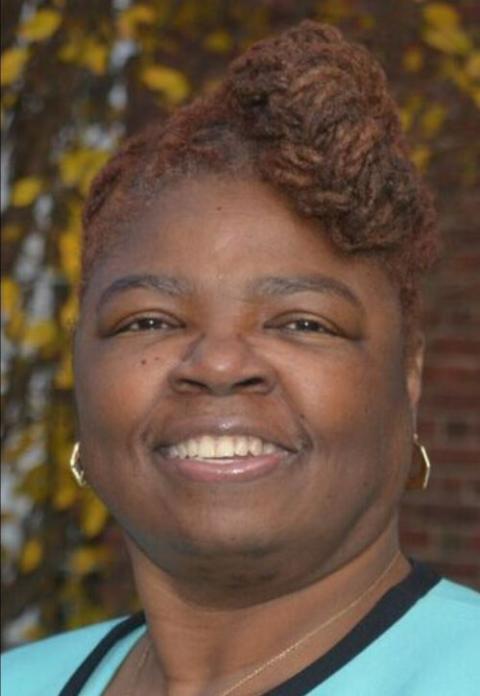
Light shines through the Incarnation Dome of the Basilica of the National Shrine of the Immaculate Conception in Washington, D.C. (Wikimedia Commons/APK)
The team leading the U.S. bishops' participation in Pope Francis' ongoing three-year synod process held two listening sessions with American Catholic theologians on May 25 and June 6, inviting members of the six major national theological societies to be in the virtual discussions.
Several of the academics who took part in one of the unusual high-level encounters praised the bishops for creating a rare opportunity for relationship-building between U.S. prelates and theologians. But they also said they raised some concerns about the organization of the latest phase of the synod process, the virtual continental meetings for the U.S. and Canadian Catholic churches.
Jaisy Joseph, an assistant professor of theology and religious studies at Villanova University, said it was significant that theologians from all six national societies were given a chance to be part of the meeting, especially given the theological polarization that sometimes exists between members of different groups.
Joseph, who took part in the May 25 session, said it was also an opportunity to begin to mend "the broken relationship between many bishops and theologians."
She cited theologian Charles Curran's 2021 volume documenting the first 75 years of the Catholic Theological Society of America, which explored the sometimes difficult relationship between the U.S. bishops' conference and the group, usually considered the primary national theological society.
Francis' synod process is being held over three phases, and is leading to in-person meetings of the Synod of Bishops in Rome in October 2023 and October 2024. The U.S. and Canadian continental meetings were held virtually last winter, and resulted in the release of a 36-page joint document.
C. Vanessa White, an associate professor of spirituality and ministry at Catholic Theological Union in Chicago, told NCR she raised concerns about that joint document in the May 25 session.
White said she "felt that there had been a watering down of certain distinctions" in the text, especially compared to another document that had been distributed when she was a delegate for the U.S. and Canadian meetings.
"This version did not mention racism once in the document," said White. "It did not mention disability at all," she added, highlighting that the document instead uses the term "those with varying degrees of physical or mental abilities."
'I see it as an action of the Holy Spirit that we were brought into dialogue precisely as theologians.'
—Jaisy Joseph
Joseph, who focuses on ecclesiology and theological anthropology, echoed the concern that race often appeared in "a litany of all exclusions" and said that each wound should be given more weight so that they are better understood.
Theologians of color have been speaking for some time about "who is Christ and how Christ responds to the pain of racism in the U.S. Catholic Church, and I think the bishops would really benefit from reading and incorporating some of those insights into their documents," Joseph said.
NCR reached out to the synod team of the U.S. Conference of Catholic Bishops for an interview about the listening sessions with theologians. In response to that inquiry, the bishops' media relations team declined comment, saying the sessions were closed to the press "in order to maintain the integrity of the Synod process."
The media team also claimed the theologians taking part in the sessions had agreed to keep the conversations confidential.
Advertisement
Joseph told NCR her understanding was that participants could talk about the discussions in general terms afterward, without naming who had said any particular statement. White also told NCR her understanding was along the same lines.
Valerie Lewis-Mosley, a pastoral theologian and adjunct professor of theology at both Caldwell University in Caldwell, New Jersey, and Xavier University's Institute for Black Catholic Studies in Louisiana, also took part in the May 25 session.
She, too, contested the bishops' conference's claim that the attendees agreed not to speak to the press. "I have a right to speak to whoever I so choose to because I did not speak from anybody else's perspective but my own," said Lewis-Mosley.
The academic, who said she has a deep understanding of the use of confidentiality as a spiritual director and from more than 50 years of work in health care, added: "The fact that someone would have the audacity to say that no one was supposed to be speaking at all, they need to go and understand confidentiality."
'Without a vision that is inclusive of all of us, our church will continue to dwindle.'
—Valerie Lewis-Mosley
"This is the problem with our church," she said. "Everyone wants to do things in such a degree of secrecy. For what?"
Lewis-Mosley said that during the May 25 session she raised the concern that the Canadian and U.S. final document's description of the delegates at the North American continental stage included no information about the racial or ethnic background of the participants, even though it included information about their genders and roles in the church.
Lewis-Mosley also said she wished the document mentioned the sainthood causes of six African American Catholics."Our lives and sacredness matter as well," she said.
In preparation for her listening session, Lewis-Mosley said she called lay Black Catholic women to ask them if they felt like they had had the opportunity to engage in the synod, and some responded that they had not been adequately informed about the synod. Lewis-Mosley carried concerns about the inclusion of laity, women and Black Catholics into the listening session.
C. Vanessa White said that she would have liked for theologians to be included earlier in the U.S. synod process. 'What's happening is that we're seeing the document after it's already been written.'
White also shared concerns that the synod had not been adequately communicated with marginalized Catholics.
"We have leadership who are not communicating this document to the people," especially "those who are on the margins in the Black community, in the Latino community, the LGBTQ communities, in the disabled community," she said.
White said that she would have liked for theologians to be included earlier. "What's happening is that we're seeing the document after it's already been written," she said.
However, White said, "I have hope in the fact that they realized [our voices were missing] because the document could have been sent on without our voice at all, so the fact that we were finally invited to be a part of this process is important."
Joseph said she was "surprised and just happy we were included." She said, "I see it as an action of the Holy Spirit that we were brought into dialogue precisely as theologians."
The theologians said they had positive interactions with bishops throughout the listening session.
"There were bishops who were a part of some of these listening sessions who I really felt were being open to the spirit of the synod," said White, sharing that the interactions were hopeful.
Joseph agreed. She said Bishop Daniel Flores, who took part in the session, "was deeply engaged and listening." Flores, bishop of Brownsville, Texas, is leading the U.S. bishops' synod team.
Lewis-Mosley said she walked away from the conversation with the understanding that theologians were interested in a church where the tent was enlarged to the point it was "borderless." (One of the Vatican's documents for the synod exhorted Catholics to "enlarge the tent" of the church.)
She described a church not "just focused on the maintenance of our concrete structural church communities," but instead "really engaged in those action things that would lead folk to believe that they too were valued" and "that their voices and their concerns of everyday needs were being met."
Lewis-Mosley said she was concerned about Black and brown youth leaving the church because they do not feel the church is responding to racism. "Without a vision that is inclusive of all of us, our church will continue to dwindle," Lewis-Mosley said.
"I'm not so much concerned about numbers as I am concerned about authentic activity," she said.
"We have come into the 21st century still with a one-size-fits-all perception of what Catholic identity is," Lewis-Mosley said.
Joseph, an Eastern Catholic of the Syro-Malabar rite, said that she felt a hesitance "from all sides of the theological spectrum" to take "a leap of faith" into being fully receptive to communal discernment, saying theologians and the wider church could continue to grow in the practice of spiritual conversation.
She said that one of the major goals of synodality is "that we have to realize that none of us are called to be comfortable in our categories."
"We have to be challenged by encountering the other, who's also our fellow pilgrim," she said.
Six theological societies — the Academy of Catholic Hispanic Theologians of the United States, Academy of Catholic Theology, Black Catholic Theology Symposium, Catholic Theological Society of America, College Theological Society and Fellowship of Catholic Scholars – were invited to each send 10 delegates to each listening session.
U.S. bishops were also invited to attend and could choose a theologian from their diocese to attend as well.










